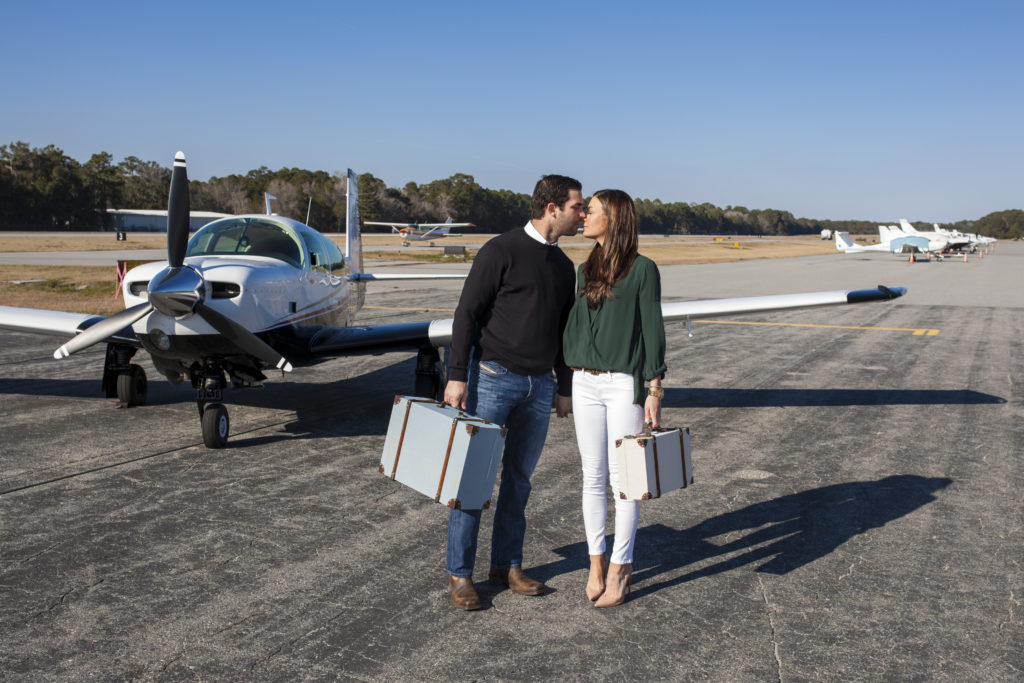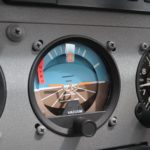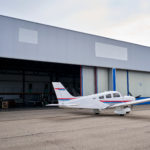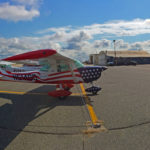Flight Training
Discovery flights for $85
Put yourself in the pilot seat
for half an hour
Learn To Fly
If you are considering learning to fly, Bemidji Aviation will take you through all the steps. We have skilled Certified Flight Instructors always ready to take on new students. Read our Frequently Asked Questions about Learning to Fly or contact us at (218) 751-1880.
F.A.Q
How many times have you dreamt of flying an airplane? Whether it is for pure fun and excitement or pursuing a new career in aviation, learning to fly is surprisingly easier and more affordable than many people think. So when you decide you’re ready to move beyond the passenger seat, a Private Pilot Certificate is your starting point.
We at Bemidji Aviation Services, Inc. can put you in the pilot’s seat at any pace or budget you chose. You select the time of day, evening or weekend and the number of training sessions per week that best suits your schedule. You may even select your own flight instructor from our team of professionals based upon your unique personality, age, and interests.
Becoming a pilot requires two elements: ground and flight training. Subjects that will be covered in the ground lessons include: aerodynamics; aircraft systems; meteorology; the national airspace system; radio communications; aircraft performance; navigation; and night flying procedures to name a few. Flight training is more exhilarating because you have the freedom of three-dimensional movement (up-down as well as left-right), greater speed, and unbelievable panoramas. Under the watchful eye of our flight instructors, you will soon be flying a plane as easily as riding a bicycle.
Imagine yourself in the pilot’s seat of a real airplane in flight. You push the throttle forward and within seconds you are climbing into the skies. You are flying, you are a pilot!! A Discovery Flight will place you and up to two guests into the world of a pilot. One of our FAA Certified Flight Instructors will guide you through a ground discussion and weather briefing, followed by a hands-on preflight of the airplane, takeoff, in-flight maneuvers, landing and post-flight debrief.
The best part, YOU will have the controls almost the entire flight! From takeoff to landing you will experience the hands-on fundamentals of flight. Under the watchful eye of your instructor you will be allowed to pilot the aircraft in turns, climbs, and descents to see just what flying is all about thousands of feet above the earth.
Often, a Discovery Flight is the official start to your journey to becoming a pilot. This wonderful experience is offered at a discounted price. Discovery Flights make a great birthday, holiday, graduation, or anniversary gift for that special person. A Discovery Flight certificate also makes a truly unique gift for that special friend or family member who has always had a yearning to fly! Because of the hands-on nature of a Discovery Flight, this will NOT simply be an airplane ride. These flights are $85 for a half an hour.
Your first solo flight represents the culmination of your earliest flight training efforts. It is the first major step in your flight training and it has been cloaked in tradition since the beginning of flight. Simply put, your first solo flight will change your life.
After you have learned some basic maneuvers, taken a pre-solo written test, and learned to land safely, your instructor will suddenly, one day, exit the airplane and tell you to do three take-offs and landings. As he walks away, you will sense that you are about to cross an important threshold. You are leaving the nest for the first time. When you taxi back to the terminal, you will feel exhilaration, a sense of accomplishment, and perhaps for the first time the realization that you WILL be a pilot. A pilot’s first solo flight is often seen as a rite of passage. There is a great deal of tradition behind this step in a pilot’s training, and it is often a special occasion.
After your first solo your shirttail is cut as you step out of the aircraft. This is a very old tradition and no one is certain as to its origin, but it continues nonetheless. One suggested origin of this tradition is that before there were headsets that allowed a student pilot and his instructor to communicate, the instructor would sit behind the student and yell instructions into his ear. To get his attention, the teacher would yank on the student’s shirttails. Once the student soloed and didn’t need the instructor, the shirttails would be cut off.
Yes there is depending on the cause of your fear. The most common fears of flying include fear of crashing (which is the most common reason); a fear of closed in spaces or heights; a feeling of not being in control; and a fear of turbulence. Fear is an emotion induced by a perceived “threat” or something that is “unknown”. The fear of flying receives more attention than most other phobias because air travel is often difficult for people to avoid. If a phobic flier were able to fly in the cockpit, the pilot’s facial response to an unexpected noise or motion would adequately prove the absence of danger.
At Bemidji Aviation we can’t “treat” or “cure” a fear of flying. You are the only one with the influence to change your perceptions. However, we can explain how an airplane flies and provide you a basic understanding of flight that enables you to conquer your fear. Education can help in overcoming the fear of flying by removing the “unknown” and can considerably diminish concerns about personal physical safety.
One of our own talented, professional FAA Certified Flight Instructors will guide you through a ground discussion on the principles of flight, explaining how aircraft fly, how airliners are flown in practice and other aspects of aviation. Understanding what a certain sound is, or that an encounter with turbulence will not destroy the aircraft, or how the air traffic system works is beneficial to easing the fear of the unknown.
The one word answer would be “time”, traveling by air often reduces travel time by 50% or more. Air transportation is the fastest mode of transport over longer distances. There is no substitute for air transport when people or commodities need to be at a destination quickly.
COSTS OF PILOT INSTRUCTION
Private Pilot Certificate Cost Estimate
Cost is based on a Cessna 172 price
Based on 50 hours of total flight time (actual flight times will vary)
20 Hours Ground Instruction
20 hrs x $45 = $900
30 Hours Flight Instruction
30 hrs x $45 = $1,350
20 Hours Solo Aircraft Time
20 hrs x $103 = $2,060
30 Hours Dual C172 Aircraft Time
30 hrs x $103 = $3,090
Other costs:
- $160 medical exam and Student Pilot Certificate
- $350 ground school, books and supplies
- $150 FAA Knowledge Test Fee (written test)
- $400 FAA Examiner’s Fee (flight test)
Total Cost: $8,460*
How to pay
Option #1
Pay as you go, we take cash, checks and all major credit cards
Option #2
Pre-pay on your account with check or cash and receive a 5% discount. You must pay at least $3,000 down on your account to start. Pre-pay accounts must maintain a $500 balance.
TIME
The length of time to obtain a Private Pilot Certificate varies on the student’s ability to recall learned knowledge and individual study techniques. The Private Pilot License may be obtained in as little as 30 days.
Flight/Ground Instruction Rates
| BASI Aircraft | Other Aircraft | |
| Primary Instruction | $ 45.00 | $ 55.00 |
| Advanced Instruction | $ 55.00 | $ 65.00 |
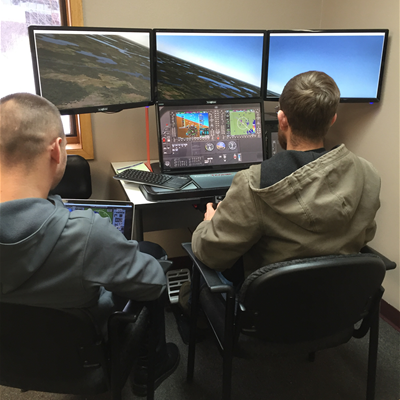
FLY THIS SIM TOUCH TRAINER
Bemidji Aviation owns a Fly This Sim Touch Trainer – Standard. Maintain instrument currency and stay sharp on aircraft normal and emergency procedures.
The simulator is FAA rated for instruction.
Inquire about hourly rates and availability.
RULES
- An Authorized Instructor must provide and certify the simulator for use to be eligible to log time and approaches.
- For instrument and approaches: You must be in IMC to log the time.
- You may log Total, A/C Category, Dual, PIC, Day/Night, Simulator Instrument and Approaches
- You May NOT log: Cross country, Landings, Actual Instrument, Simulated Instrument, Solo.
- FAR 61.65(i)(2)Instrument Rating: Up to 20 hours instruction can be logged towards your instrument rating – *NOTE* this was recently changed from 10 hours -click here for details –
- FAR 61.109(k)(1)Private Pilot Certificate: Up to 2.5 hours in the introduction to the operation of flight instruments can be logged towards your private pilot rating
- FAR 61.57(c)(3) and (4) Use of an aviation training device for maintaining instrument experience. Please read the reg. on this as it is somewhat complicated.

